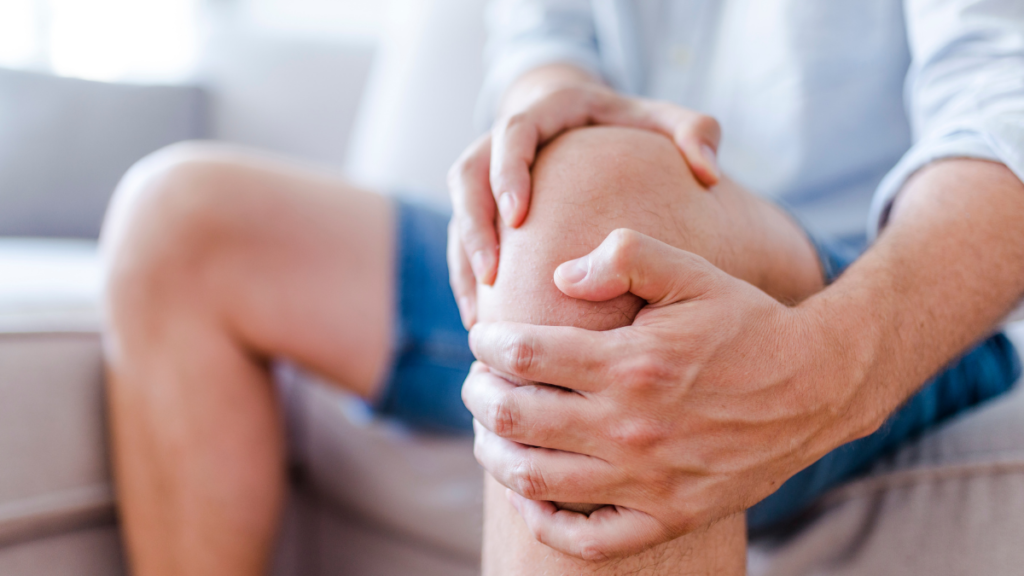Chronic pain affects more than 20 percent of adults in the United States. Many people attribute their pain to arthritis, which is the inflammation of one or more joints.
According to the Centers for Disease Control and Prevention (CDC), 54 million people in the U.S. have arthritis. About a quarter of those with arthritis experience severe pain, and nearly half report that the pain associated with their arthritis is chronic, meaning it has been present on all or most days for at least the last three months.
September is Pain Awareness Month, and to increase understanding about the types and causes of pain, Vivera would like to highlight a few common types of arthritis and how the associated pain impacts those affected.
Common Types of Arthritis
Osteoarthritis
There are more than 100 types of arthritis, but the most common is osteoarthritis, affecting over 32.5 million adults in the United States.
Osteoarthritis affects over 32.5 million US adults.
This type of arthritis is often called “wear and tear” arthritis because it occurs when the joint cartilage between the bones is damaged or breaks down.
Osteoarthritis more frequently occurs in the hands, hips, and knees, but it can also affect other areas of the body, including the neck and feet. Signs and symptoms of osteoarthritis include pain or aching, stiffness, decreased range of motion, reduced flexibility, and swelling.
Those most at risk for osteoarthritis are the elderly, and those with joint injuries, or those who place repeated stress on their joints from work or recreational activities such as sports.
Rheumatoid Arthritis
Rheumatoid arthritis is an autoimmune inflammatory disease that primarily affects the joints. When a person has this type of arthritis, their white blood cells accumulate in the joints, causing pain and swelling. As the disease progresses, it damages the joint tissue.
There are two main phases of rheumatoid arthritis: flares, when symptoms are worse, and remission, when symptoms improve. The signs and symptoms of rheumatoid arthritis include pain, aching, stiffness, or tenderness in more than one joint, general weakness, fatigue, weight loss, or fever.
As rheumatoid arthritis is an autoimmune disease, doctors believe that a genetic component is likely, and those with a family history of the disease are at an increased risk.
Fibromyalgia
Fibromyalgia is a condition that causes pain and stiffness all over the body, and it affects 4 million adults in the United States. It is often associated with sleep disturbances, fatigue, headaches, cognitive problems, depression, and anxiety.
Those with fibromyalgia tend to be more sensitive to pain than people without fibromyalgia, and it disproportionately affects women, as they are twice as likely to have fibromyalgia than men.
Although the cause of fibromyalgia is unknown, there are various methods available to manage its symptoms, including medication, aerobic exercise and strength training, stress management, and cognitive-behavioral therapy.
Gout
Another common type of arthritis is gout, which occurs when there is too much uric acid in the body. Grout is very painful, and it usually affects one joint at a time, most commonly the big toe. This type of arthritis usually flares up for a few days or weeks before going into remission, and a person may not experience symptoms again for weeks, months, or even years.
Symptoms of gout include intense pain, swelling, redness, and heat in one area. While there is no cure for gout, and uric acid accumulation is influenced by genetics, there are ways to manage symptoms, including medication to manage the pain and diet, and lifestyle changes.
Psoriatic Arthritis
Psoriatic arthritis is an autoimmune disease, which occurs when an overactive immune system attacks healthy tissues in the body. This type of arthritis affects about 30 percent of people with psoriasis, a skin disease that causes red, itchy, and scaly patches on the body. Symptoms of psoriatic arthritis include swelling, stiffness, and pain in the joints and their surrounding tissues. A person with this type of arthritis may also notice changes in their nails, along with extreme fatigue.
Like all types of arthritis, there is no cure available. There are, however, treatments that target the condition and its associated symptoms, such as non-steroidal anti-inflammatory drugs, steroid injections into the affected joints, disease-modifying anti-rheumatic drugs, and biological therapies. Creams and ointments, retinoid tablets, ultraviolet therapy, and some disease-modifying anti-rheumatic drugs and biological therapies that treat arthritis may also be effective for psoriasis.
Juvenile Arthritis
Arthritis that occurs in children is referred to as juvenile arthritis, and it affects nearly 300,000 children in the United States. There are various types of juvenile arthritis, the most common being juvenile idiopathic arthritis, affecting more than 50,000 children in the United States.
Juvenile arthritis is often characterized by joint pain, swelling, fever, stiffness, rash, fatigue, inflammation of the eye, loss of appetite, and difficulty with various activities of daily living, including walking, dressing, and playing. Some types of juvenile arthritis can also cause complications, including growth problems.
Although the exact causes of juvenile arthritis are not known, genetics and environmental factors are thought to play a role.
Lupus
Lupus is a chronic autoimmune disorder that causes inflammation and pain in the body, most commonly your skin, joints, and internal organs. There are four types of lupus, with the most common being systemic lupus, the symptoms of which can range from mild, only affecting the blood pressure in the lungs, to severe, causing inflammation in the kidneys, nervous system, and blood vessels.
Lupus most commonly affects women, accounting for nine out of ten cases. The signs and symptoms of lupus vary, but common characteristics include a butterfly rash, extreme fatigue, and joint pain.
Arthritis Pain Can Be Devastating
Like all types of pain, the pain associated with arthritis can have devastating effects on a person’s overall quality of life. Not only can it affect a person’s ability to perform specific tasks and work in certain roles, but arthritis pain can also affect a person’s ability to maintain relationships and participate in activities they enjoy.
Arthritis can affect a person's ability to maintain relationships and participate in activities they enjoy.
By working on non-addictive pain management solutions, Vivera can help those suffering from arthritis pain without the harmful side effects that often come with the medications used to treat chronic pain.


